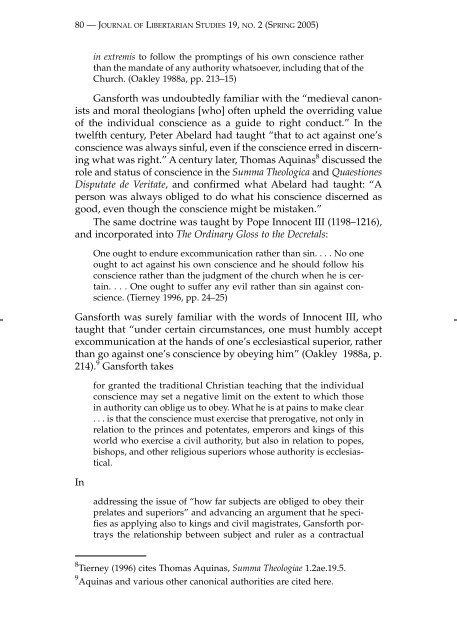Quod Omnes Tangit
Quod Omnes Tangit
Quod Omnes Tangit
You also want an ePaper? Increase the reach of your titles
YUMPU automatically turns print PDFs into web optimized ePapers that Google loves.
80 — JOURNAL OF LIBERTARIAN STUDIES 19, NO. 2 (SPRING 2005)<br />
in extremis to follow the promptings of his own conscience rather<br />
than the mandate of any authority whatsoever, including that of the<br />
Church. (Oakley 1988a, pp. 213–15)<br />
Gansforth was undoubtedly familiar with the “medieval canonists<br />
and moral theologians [who] often upheld the overriding value<br />
of the individual conscience as a guide to right conduct.” In the<br />
twelfth century, Peter Abelard had taught “that to act against one’s<br />
conscience was always sinful, even if the conscience erred in discerning<br />
what was right.” A century later, Thomas Aquinas 8 discussed the<br />
role and status of conscience in the Summa Theologica and Quaestiones<br />
Disputate de Veritate, and confirmed what Abelard had taught: “A<br />
person was always obliged to do what his conscience discerned as<br />
good, even though the conscience might be mistaken.”<br />
The same doctrine was taught by Pope Innocent III (1198–1216),<br />
and incorporated into The Ordinary Gloss to the Decretals:<br />
One ought to endure excommunication rather than sin. . . . No one<br />
ought to act against his own conscience and he should follow his<br />
conscience rather than the judgment of the church when he is certain.<br />
. . . One ought to suffer any evil rather than sin against conscience.<br />
(Tierney 1996, pp. 24–25)<br />
Gansforth was surely familiar with the words of Innocent III, who<br />
taught that “under certain circumstances, one must humbly accept<br />
excommunication at the hands of one’s ecclesiastical superior, rather<br />
than go against one’s conscience by obeying him” (Oakley 1988a, p.<br />
214). 9 Gansforth takes<br />
In<br />
for granted the traditional Christian teaching that the individual<br />
conscience may set a negative limit on the extent to which those<br />
in authority can oblige us to obey. What he is at pains to make clear<br />
. . . is that the conscience must exercise that prerogative, not only in<br />
relation to the princes and potentates, emperors and kings of this<br />
world who exercise a civil authority, but also in relation to popes,<br />
bishops, and other religious superiors whose authority is ecclesiastical.<br />
addressing the issue of “how far subjects are obliged to obey their<br />
prelates and superiors” and advancing an argument that he specifies<br />
as applying also to kings and civil magistrates, Gansforth portrays<br />
the relationship between subject and ruler as a contractual<br />
8 Tierney (1996) cites Thomas Aquinas, Summa Theologiae 1.2ae.19.5.<br />
9 Aquinas and various other canonical authorities are cited here.
















